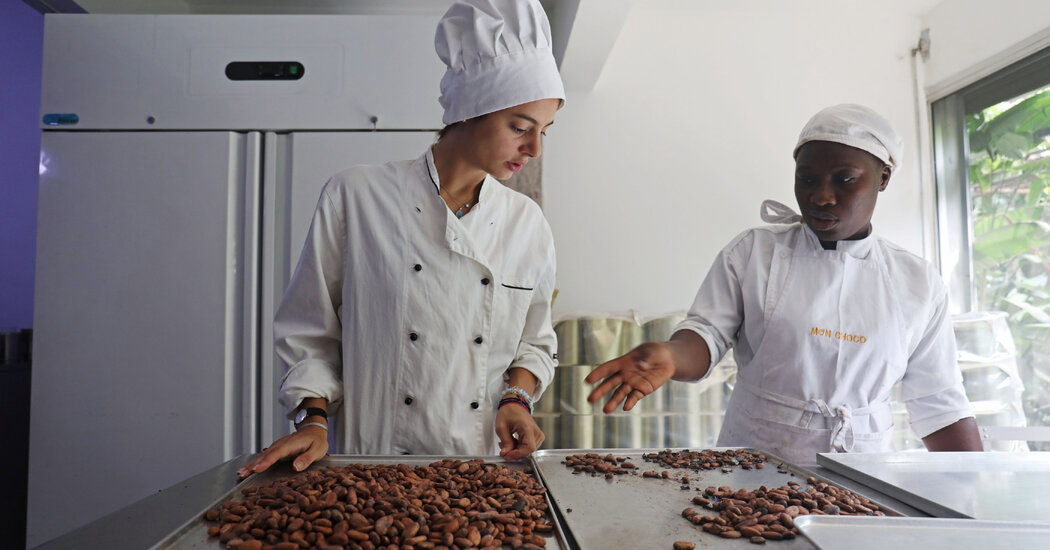Dana Mroueh, a small-business owner in Ivory Coast, was negotiating to introduce her organic chocolate bars into stores in New York and Washington when President Trump announced new tariffs on all U.S. imports last week.
Ivory Coast is the world’s biggest cocoa producer, and the United States is the world’s largest consumer of chocolate, though most of it comes from Canada and Mexico.
Ms. Mroueh wants more chocolate from Africa to break into the American market. Her company, Mon Choco, is part of a new generation of West African chocolatiers striving to create jobs and wealth at home by transforming raw cocoa beans into processed delicacies. “We were hoping to start exporting within the next few weeks,” she said.
Now, along with the hundreds of millions of dollars worth of cocoa beans imported by the United States from Ivory Coast annually, her mango, ginger and coffee flavored chocolates are facing a 21 percent levy that she fears will badly hurt her business. The tariffs are expected to hobble several African economies that had long seen in the United States a welcoming market.
It is not just cocoa. Car parts from South Africa and apparel from Madagascar will also be hit, and Lesotho, the southern African nation that provides denim used in jeans, is poised to bear some of the highest levies, at 50 percent.
“We’re definitely going to face some issues,” Ms. Mroueh said.
The tariffs come as African nations are still reeling from the dismantling of the U.S. Agency for International Development. The agency, which provided crucial foreign aid on the continent for more than six decades, was gutted shortly after Mr. Trump took office in January.
“The United States’ credibility in Africa had already been damaged by the sudden closure of aid programs,” said Karen Mathiasen, a project director at the Center for Global Development. “Now the tariffs will only add to that, because there’s no methodology and no clear signal for African countries on what to do to get rid of the tariffs.”
In Ivory Coast, farmers have been picking cocoa husks this month as part of the semiannual harvesting season. Nearly six million people rely financially on cocoa in the West African nation, which produces about 45 percent of the world’s crispy sour beans that are turned into sweet treats.
Global cocoa prices have nearly tripled over the past two years because of low supplies caused by poor weather in Ivory Coast and Ghana, the world’s second-largest producer. Yet most West African farmers live in poverty, with intermediaries reaping the benefits of the lucrative industry.
Global chocolate manufacturers like Mars, Hersheys and Cargill, did not respond to a request for comment on how the new U.S. tariffs might affect their imports.
Europe, not the United States, remains the main destination for Ivorian cocoa, and Asia has been a fast-growing market in recent years. Still, the American tariffs only add to the uncertainty of the African cocoa sector, which has struggled in recent years to increase its value by producing semi-processed and processed goods like cocoa paste and chocolate.
“Are we going to export less because consumers might consume less?” asked Olga Yenou, an Ivorian entrepreneur whose company, Tafissa, exports more than 20 percent of its production of cocoa paste and butter to the United States.
Before this week, more than 30 African economies had been exporting goods to the United States duty free as part of an agreement called the African Growth and Opportunity Act.
The legislation supporting the act expires in September. On the other end, China eliminated tariffs for goods from 33 African countries in December last year. At $295 billion last year, its level of trade with African economies was four times higher than U.S.-Africa trade.
African leaders and analysts studying the continent’s economies have called on the United States to renew the free-trade agreement, though the new tariffs have effectively ended it already, economists say.
“Africa isn’t shielded by the trade agreement it had with the United States,” said Zainab Usman, the head of the Africa program at the Carnegie Endowment for International Peace in Washington, D.C. “But that means that it might be possible to negotiate a new future for U.S.-Africa trade relationships.”
In Ivory Coast, cocoa prices have fallen by more than 10 percent since last week. There are concerns among exporters that more U.S. chocolate makers will now turn to cocoa-producing countries like Ecuador, which is facing lower tariffs, to do business.
For artisanal chocolate makers like Ms. Mroueh, a once-alluring market suddenly looks confusing and volatile. “We’re a bit lost now,” she said.
